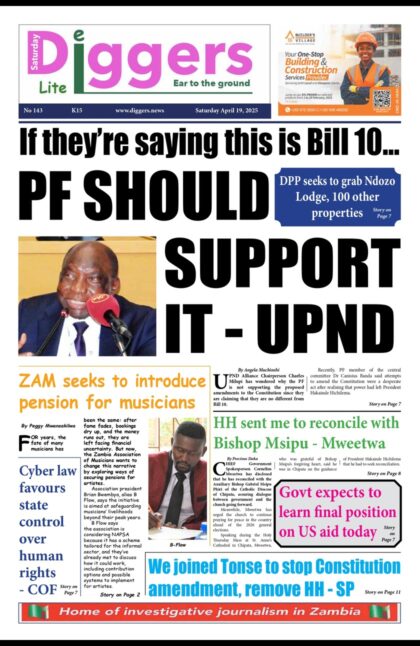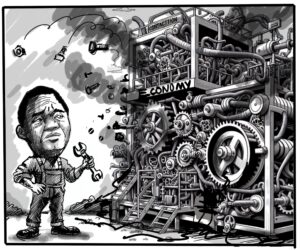JUSTICE Minister Mulambo Haimbe says he doesn’t see why some Cyber Security and Cyber Crimes Act provisions can’t be repealed because people have spoken against them.
And Haimbe says government’s position on the constitutional reform process will test the UPND’s political will.
Speaking when he featured on The Village ZM’s Twitter Space, Wednesday, Haimbe said he was also an advocate of repealing certain provisions in the Cyber Security and Cyber Crimes Act.
“The Cyber Security and Cyber Crimes Act provides for a mechanism by which electronic communication is monitored. Ultimately, where there is cyber bullying and any other criminal activity takes place, then that Act kicks in. The question that has arisen repeatedly is whether or not defamation should be criminalised given the civil remedies, of course that is an ongoing debate. For example, defamation of the President where people say it is a way of gagging people from expressing themselves. The general principle is that even the Constitution recognises that your freedoms and my freedoms are not without limitation. So one cannot say they are enjoying their freedom of expression and insult. My freedoms end where yours begin. So it is a matter of the extent of which this defamation takes place. I was a proponent of the repeal of various provisions which were quite negative in the Cyber Security Act. The media have also said they do not support the current bill in its format. So when the people have spoken, I do not see the reason why a repeal of certain provisions of that law cannot be done,” Haimbe said.
And Haimbe said government’s position on the constitutional reform process would test the UPND’s political will.
“The constitutional reform process can be in many forms. As a country, we use the Inquiries Act and the establishment of a commission of inquiry as a means of effecting constitutional amendment. That has been done in the past with four or five constitutional review commissions. The question is are we going to use the Inquiries Act? As government, we are also entitled to take a position. Cabinet must be engaged with a proposed roadmap and obtain approval. The people of Zambia will then be told and processes will follow. The commission is a very costly exercise,” he said.
“The preferred route is a technical committee to take the views via those commissions and go round to take views of the people hit based on a draft. Government is consulting in order for us to achieve the stage where the Cabinet must give approval for the direction we must take. By the way, a commission is more costly because you are starting from scratch. Ours is to make sure that when the draft comes out, the government’s position does not change the views coming from the people of Zambia. That is where our political will be tested by yourselves.”
He said the constitution amendment process would take longer because it needed to be done properly.
“The political will must promulgate laws that prioritise the interests of the people. Looking at the USA constitution, it has lasted for more than 200 years and only amended a number of times, that is what we should aspire for. It is tiring and we need to get past this business of amending constitutions in piecemeal to suit the political aspirations of people in government at a particular time,” he said.
“We need to show a difference as a new dawn government because there is fatigue. However it is not something that will be done in a couple of months, perhaps not even in a couple of years because we want it to be done properly. We could be going through this process especially since the referendum is very expensive and we have to find money for it, we could be talking about a couple of years even slightly more.”
Haimbe said various parts of the constitution were not in line with keeping the democratic principles of the country.
“There are various parts of the constitution that are not in line with keeping the democratic principles of the country. Right now, the constitution in terms of the bill of rights focuses on the political rights without having proper recognition of the social and economic rights. That is something that we have to address via the referendum. It is absolutely necessary that we do this properly to have a constitution that stands a test of time,” he said.
Haimbe also said the Public Order Act would be re-looked in its entirety in the next sitting of Parliament.
“The Public Order Act amendment is one of our key priorities. The Act must ensure that it aligns to our aspirations as a people. It must not be abused as a tool to oppress the opposition. So to all purposes, it was impossible to deal with any legislation including the Public Order Act. That will be done in this session which begins on 15th February,” said Haimbe.
“The internal processes began a long time ago and in this case, there was a draft bill that was done by the PF which did not meet the various aspirations of the UPND, therefore it was rejected. So it has to be looked at with a fresh pair of spectacles by the user Ministry of Home Affairs. We need to understand how these things work and you cannot promulgate laws like you are buying bread in a supermarket.”















